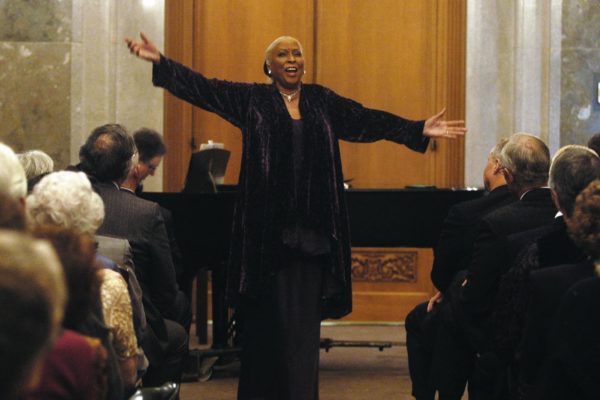AUSTIN, Texas — The University of Texas at Austin mourns the loss of world-renowned mezzo-soprano and alumna Barbara Smith Conrad (B.M., 1959), whose distinguished career has touched the lives of audiences around the world. Conrad died from complications related to Alzheimer’s disease in the early hours of Monday morning, May 22. She was part of the Precursors, the first African American students to attend and integrate The University of Texas at Austin. As one of the first African American undergraduates admitted to the university in 1956, the young music student was among the early pioneers in the movement to create a more open and diverse university community.
“Barbara Conrad was a trailblazer — from her Precursor days at UT in 1956 and throughout her distinguished opera career,” said Gregory L. Fenves, president of UT Austin. “Her accomplishments and tenacity represent an important chapter in the university’s history. We will miss her talents and presence on the Forty Acres and beyond.”
With her natural talents and stage presence, Conrad was encouraged to audition for the university’s 1957 production of “Dido and Aeneas.” She won the role of Dido, the queen of Carthage, opposite a white male student as Aeneas, her lover. The biracial casting controversy that ensued escalated to the Texas Legislature, and when lawmakers threatened to pull funding, the president of the university made the decision to remove Conrad from the cast.
“I felt so trapped,” Conrad said of the experience. “I wanted to just say everything that came into my mind, but I was trying to be that person who was a healer. That was part of the upbringing. You tried to make peace and not war.”
After national media coverage drew attention to her story, singer Harry Belafonte offered to underwrite her studies at an institution of her choice, but Conrad ultimately decided to remain at the university and complete her music degree.
Her story was shared with millions through the Dolph Briscoe Center for American History’s award-winning documentary “When I Rise.” The film premiered at the 2010 South by Southwest Film Festival and aired nationally on the PBS series “Independent Lens.” It has since been distributed globally. “When I Rise” includes touching scenes of Conrad singing beneath the dome of the Texas Capitol during the 2009 legislative session after state lawmakers passed a resolution honoring her.
“Barbara’s personality was characterized by peace and strength. She never saw herself as a victim and never let her role in the struggle for civil rights define her. Instead, she met controversy and prejudice with courage, grace and hope,” said Don Carleton, executive director of the Briscoe Center. “I will always be grateful for her generosity, donating her papers to the center, working closely with us on “When I Rise,” and helping us, along with Admiral Bob Inman, in establishing the university’s Endowment for the Study of American Spirituals.”
After graduating from UT Austin, Conrad went on to have a distinguished career as an opera singer. She performed with New York’s Metropolitan Opera for eight years from 1982 to 1989, and she performed leading operatic roles with the Vienna State Opera, the Teatro Nacional de Venezuela, the Houston Grand Opera, the New York City Opera, the Pittsburgh Opera and many other opera houses throughout the United States, Canada, Europe and South America. Under the direction of some of the world’s leading conductors, she performed much of the mezzo-soprano repertoire with the world’s greatest orchestras including the New York Philharmonic and the London, Boston, Cleveland and Detroit symphonies. The UT Austin Ex-Students’ Association named Conrad a Distinguished Alumna in 1985, and the university honored her with the founding of the Barbara Smith Conrad Endowed Presidential Scholarship in Fine Arts.
“Barbara Conrad will long be remembered around the world for her huge international career in opera. She’s a great credit to The University of Texas. On the Forty Acres she’ll never be forgotten as a student who had the courage to stand — and sing out — against segregation at The University of Texas,” said Doug Dempster, dean of the College of Fine Arts. “President Bill Powers was a tireless champion for redeeming UT’s institutional relationship with Barbara. We’re grateful to Barbara and him for giving our students the chance to study with her when she returned as a visiting professor in the Butler School of Music.”
Conrad received the Texas Medal of Arts Award for Lifetime Achievement and the History-Making Texan Award in 2011. She was appointed to the Butler School of Music as a visiting professor and artist-in-residence in 2012, and she spoke at the commencement ceremony for the College of Fine Arts that year. Prior to that, she returned to give master classes and to coach opera students in the 1990s, and she performed in two concerts in the school in 2011.





